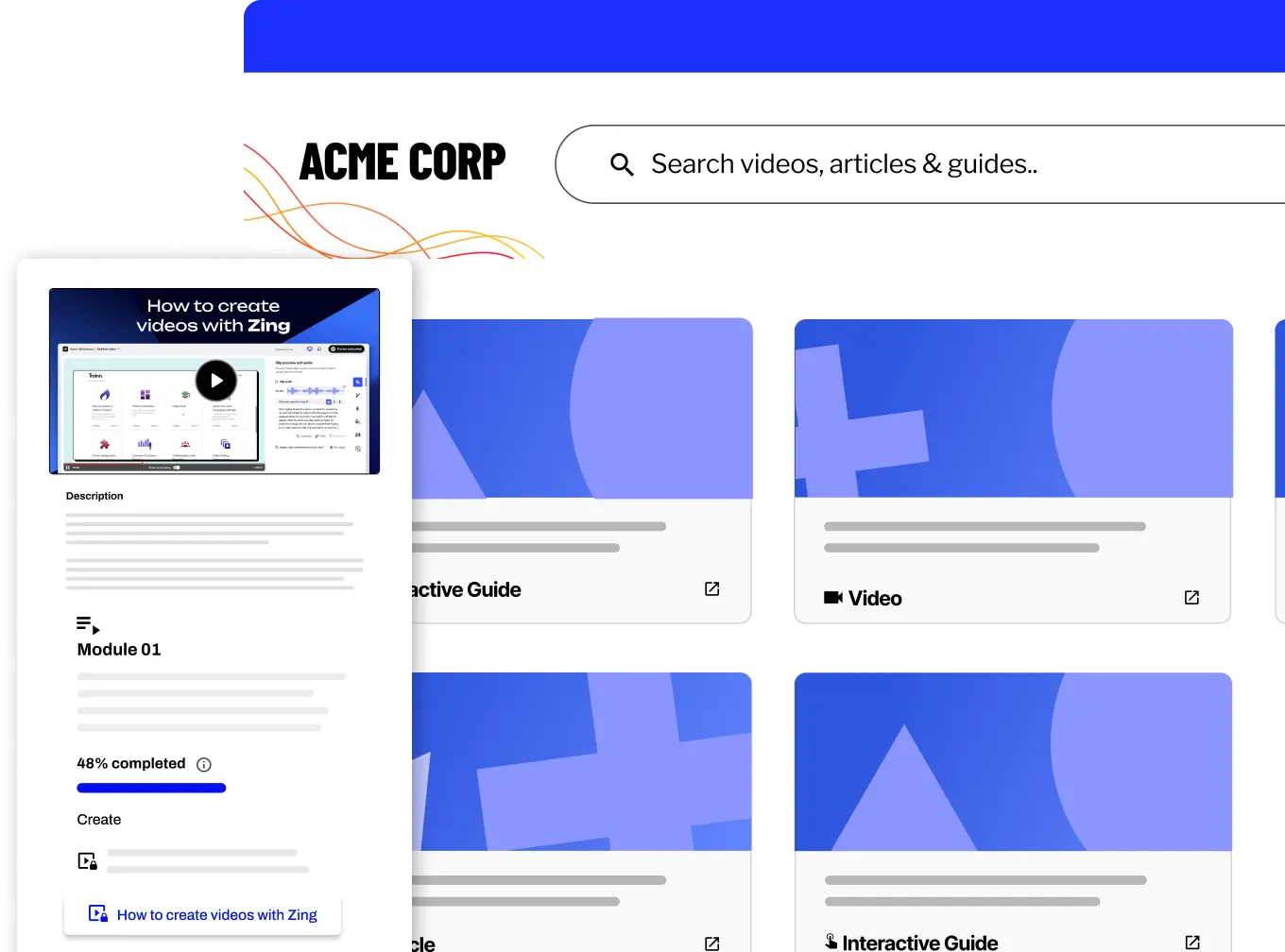- Features
- Resources
- Pricing
AI-Powered Customer Education Platform
Meet Trainn: One platform to create training videos & interactive guides, a customizable Knowledge Base, and a Training Academy.
Free for 14-days. No credit card required.
Further reads
Cloud LMS
What is a Cloud LMS?
In the realm of modern learning and development, a Cloud LMS (Learning Management System) has become an indispensable tool. At its core, a Cloud LMS is a software platform that resides on the Internet, accessible from anywhere with an Internet connection. It's designed to streamline the creation, delivery, and management of online training programs and educational content.
What are the Key Benefits of a Cloud LMS?
- Accessibility: With a Cloud LMS, learners can access educational materials from any device, anytime, anywhere, promoting flexibility and convenience.
- Cost-Effectiveness: Cloud-based solutions eliminate the need for expensive hardware, maintenance, and IT support, reducing overall costs.
- Scalability: Cloud LMS platforms can easily scale up or down to accommodate changing learner numbers or storage requirements, ensuring optimal resource allocation.
- Automatic Updates: Cloud providers handle software updates and upgrades, ensuring users always have access to the latest features and security patches.
- Collaboration and Integration: Many Cloud LMS solutions offer seamless integration with other cloud-based tools, enabling enhanced collaboration and data sharing.
Why is a Cloud LMS Important in Customer Education?
In the fast-paced world of customer education, a Cloud LMS plays a pivotal role:
- Scalability: As your customer base grows, a Cloud LMS can easily scale to accommodate increasing learner numbers and content requirements, ensuring seamless access to educational resources.
- Global Reach: With customers dispersed across different regions and time zones, a Cloud LMS, and a LMS Learning Portal ensures customer education materials are accessible anytime, anywhere, fostering consistent learning experiences.
- Rapid Deployment: Cloud-based solutions can be quickly deployed and updated, enabling organizations to swiftly roll out new training programs or update existing ones in response to evolving customer needs.
- Integration and Collaboration: Many Cloud LMS platforms integrate seamlessly with other cloud-based tools, such as Customer Relationship Management (CRM) systems, enabling better collaboration and data sharing across teams.
What are Some Best Practices for Implementing a Cloud LMS Effectively?
To maximize the benefits of a Cloud LMS, consider the following best practices:
- Conduct a Thorough Needs Assessment: Evaluate your organization's specific requirements, learner demographics, and technical infrastructure to select the most suitable Cloud LMS solution.
- Prioritize Data Security and Privacy: Ensure the Cloud LMS provider adheres to industry-standard security protocols and data protection regulations, especially when dealing with sensitive customer information.
- Encourage Adoption and Buy-In: Involve stakeholders, subject matter experts, and end-users throughout the implementation process to foster buy-in and promote active engagement with the new platform.
- Leverage Analytics and Reporting: Utilize the built-in analytics and LMS reporting features of your Cloud LMS to track learner progress, identify areas for improvement, and measure the effectiveness of your training programs.
- Develop a Change Management Plan: Implement a well-structured change management plan to facilitate a smooth transition from legacy systems to the new Cloud LMS, minimizing disruptions and ensuring user readiness.
What Tools or Technologies are Commonly Used in a Cloud LMS?
A Cloud LMS, like Trainn, often integrates with various tools and technologies to enhance its functionality and deliver a comprehensive learning experience:
- LMS Content Authoring Tools: Solutions like Trainn, Articulate Rise, iSpring, and Lectora enable the creation of interactive, multimedia-rich learning content for cloud-based LMS Content Authoring Tools.
- Video Conferencing Tools: Platforms like Zoom, Microsoft Teams, or Google Meet facilitate live virtual training sessions and webinars.
- Learning Record Stores (LRS): These systems, often based on the Experience API (xAPI), allow for tracking and recording learner activities and achievements across multiple platforms, including Trainn SaaS LMS.
- Single Sign-On (SSO): Cloud LMS platforms frequently support SSO integration, enabling users to access multiple applications with a single set of credentials, enhancing security and convenience.
What are the Challenges of a Cloud LMS?
- Data Privacy and Security Concerns: Organizations may have reservations about storing sensitive data on third-party servers, raising privacy and security concerns.
- Internet Dependency: Cloud LMS platforms rely heavily on stable internet connectivity, which could pose challenges in areas with limited or unreliable internet access.
- Integration Complexities: Seamlessly integrating a Cloud LMS with existing on-premises systems or legacy applications can sometimes be complex and require specialized expertise.
- Vendor Lock-In: Migrating from one Cloud LMS provider to another can be challenging, potentially leading to vendor lock-in and limiting flexibility.
- Limited Customization: Some Cloud LMS solutions may offer limited customization options, which could be a concern for organizations with unique or specialized requirements.
Trainn is the only AI-powered and no-code LMS that helps SaaS businesses build an enterprise-grade Academy to drive customer training and product education at scale. Using Trainn, you can author course content, build courses with quizzes, and launch your Academy with certifications and LMS analytics.
FAQs
1. How can a Cloud LMS benefit customer onboarding and product adoption?
A Cloud LMS streamlines customer onboarding by providing easily accessible, interactive training on product features and use cases.
2. Is a Cloud LMS suitable for compliance training?
Yes, many Cloud LMS platforms offer robust security, auditing, and compliance features suitable for delivering compliance training.
3. How can organizations ensure data security with a Cloud LMS?
Thorough due diligence, selecting reputable providers, and implementing robust access controls and encryption can mitigate data security risks.




